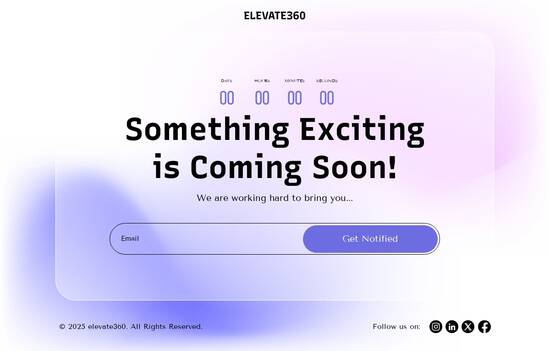
React.js optimized GDPR compliance page template
Explore Similar TemplatesAbout template
Supercharge your GDPR compliance page with React.js for outstanding performance! Learn more today.
Recommended templates

Easy to build without coding
With the intuitive drag-and-drop builder, anyone on your team can create high-converting pages without any knowledge of code or design. Make enhancements to your landing page with custom widgets using Javascript, HTML/CSS, or third-party scripts.

Multiple layouts for any industry and goal
Select from 500+ landing page layouts built to boost conversions across industry-specific scenarios. Customize them by adjusting fonts, adding images, and generating on-brand content with the AI assistant. Quickly scale with Instablocks® and Global Blocks that you can save, reuse, and update globally.

Loads fast and looks polished on any device
Every template is responsive, which means they present professionally on any device and load blazingly fast with our Thor Render Engine. You can also power them up with Google AMP technology to deliver an unparalleled mobile experience and drive higher conversions.

Robust analytics & experimentation
Get real-time updates and reporting across all your devices, showing the number of visitors, conversions, cost-per-visitor, and cost-per-lead. Launch AI-powered experiments, run A/B tests, and use heatmaps to analyze user behavior, then optimize your landing page to maximize conversions.







Easy to build without coding
With the intuitive drag-and-drop builder, anyone on your team can create high-converting pages without any knowledge of code or design. Make enhancements to your landing page with custom widgets using Javascript, HTML/CSS, or third-party scripts.
Multiple layouts for any industry and goal
Select from 500+ landing page layouts built to boost conversions across industry-specific scenarios. Customize them by adjusting fonts, adding images, and generating on-brand content with the AI assistant. Quickly scale with Instablocks® and Global Blocks that you can save, reuse, and update globally.
Loads fast and looks polished on any device
Every template is responsive, which means they present professionally on any device and load blazingly fast with our Thor Render Engine.
Robust analytics & experimentation
Get real-time updates and reporting across all your devices, showing the number of visitors, conversions, cost-per-visitor, and cost-per-lead. Launch AI-powered experiments, run A/B tests, and use heatmaps to analyze user behavior, then optimize your landing page to maximize conversions.
All the features you need to build lead-generating landing pages
Explore more featuresLearn how to build top-performing landing pages for any goal
FAQs
Leading the way in building high-performing landing pages





Optimize your marketing strategy with Instapage's powerful landing page and CRO platform
In today's competitive digital landscape, a well-crafted landing page can make all the difference in maximizing your return on investment (ROI). Instapage's platform provides an all-in-one solution specifically designed to accelerate and optimize your marketing campaigns, regardless of your budget or team size. With intuitive builders and a vast array of templates, you can boost your marketing efforts and scale your success.
Why choose Instapage for your landing page needs?
Instapage stands out as the most powerful platform for creating high-converting landing pages. It offers features tailored for all aspects of campaign management and audience engagement, ensuring your digital marketing strategies don't just reach potential customers, but actually convert them into leads.
- 100+ high-converting templates: Utilize over a hundred pre-designed landing page templates that cater to various industries. Each template is optimized for conversions and easy to customize to fit your business needs.
- Built-in experimentation features: Test different versions of your landing pages with A/B testing and analytics tools aimed at optimizing performance based on user behavior.
- Effective collaboration tools: Enhance team productivity with real-time feedback, collaborative editing, and seamless sharing options, ensuring everyone is on the same page for project success.
Step 1: Build your landing page
The first step in leveraging Instapage for your marketing initiatives involves creating your landing page. You can select from the extensive library of customizable templates suitable for various industry needs. Instapage's user-friendly interface means you don’t need any coding expertise to create visually appealing pages.
Step 2: Optimize for higher conversions
Once your page is built, it’s essential to refine it for optimal performance. Utilize heatmaps to analyze user interaction and identify areas for improvement. Conduct A/B tests to see what resonates best with your audience, ensuring you make data-driven decisions that enhance your conversion rates.
- Use heatmaps to visualize user engagement on your landing page and identify effective components.
- Implement A/B testing to evaluate which page versions yield the best results and iterate based on findings.
- Monitor performance metrics through the comprehensive dashboard, focusing on conversion rates and user interaction.
Step 3: Personalize the user experience
Personalization increases engagement significantly. Instapage provides features like dynamic text replacement to tailor content for specific audience segments. You can align advertisements with relevant landing pages using AdMaps and track engagement metrics easily.
- Dynamic text replacement allows you to deliver messages tailored to users, improving relevancy and engagement.
- Using AdMaps ensures that the content users see is consistent with the advertisements they clicked, increasing the likelihood of conversion.
- Advanced tracking tools offer insights at the audience level, allowing for continuous improvement of your campaigns.
In conclusion, Instapage equips marketers with the essential tools to create, optimize, and personalize landing pages that drive results and maximize ROI effectively.
Start your journey with Instapage today and transform your digital marketing campaigns into success stories. With easy-to-use features and powerful analytics, you’re just a few clicks away from elevating your marketing strategy.
People also ask about React.js optimized GDPR compliance page template
Creating a reactjs optimized gdpr compliance page template
Understanding gdpr compliance in modern web development
The General Data Protection Regulation (GDPR) was implemented in May 2018, marking a significant shift in how data privacy is approached in the European Union (EU). Designed to protect the personal information of EU citizens, GDPR has reshaped the data handling practices of companies worldwide. Historical context shows that data misuse incidents led to growing demands for stronger protection mechanisms, ultimately spawning this comprehensive legislative framework. GDPR emphasizes the rights of individuals over their data, requiring organizations to be transparent about their data processing activities.
The key principles of GDPR revolve around transparency, data minimization, purpose limitation, and the rights of individuals including consent, access, and erasure. Successful implementation of these principles means that any website handling EU residents’ data must be equipped with a GDPR compliance page, detailing how user information is collected, processed, and stored. By placing users' privacy at the forefront, websites not only comply with the regulations but also enhance their credibility and build trust with their users.
The importance of data privacy for users
As public awareness regarding data privacy increases, users now expect clear communication about how their personal information is utilized. This shift stems from numerous high-profile data breaches that have brought attention to the risks associated with data mishandling. Users prioritize transparency, desiring a clear understanding of the data they share and how it's used, making it essential for businesses to elevate their data privacy protocols.
Additionally, trust plays a crucial role in user experience. When users feel secure about their data management, they are more likely to engage with a website. On the contrary, the consequences of non-compliance with GDPR can be detrimental. Companies can face hefty fines, with penalties reaching up to 4% of annual global turnover or €20 million, whichever is higher. Such legal ramifications can adversely impact brand reputation, causing long-term damage to user trust that is often irreparable.
User awareness and expectations about data privacy are at an all-time high.
Transparency in data handling is now a priority for consumers.
Non-compliance can result in significant fines and damage to brand reputation.
Designing an optimized gdpr compliance page
An effective GDPR compliance page template must incorporate essential features that are user-friendly and informative. Firstly, clear and concise consent forms are vital, enabling users to make informed decisions regarding their data. It's crucial to use easy-to-understand language that demystifies legal jargon, clearly explaining the rights users have under GDPR such as the right to access their data or request its deletion. A responsive design is also critical, ensuring that users can easily navigate this information regardless of the device they’re using.
The components included in a compliance page template should address specific user needs. Cookie consent banners, for example, should be prominently displayed, enabling users to understand what cookies are being used and to customize their consent preferences easily. Furthermore, comprehensive information about data processing activities should be accessible, detailing what data is collected, for what purpose, and how long it will be retained. Making these details transparent can significantly enhance user confidence.
Clear and concise consent forms that are easy to understand.
Responsive design tailored for various devices.
Cookie consent banners to inform users about cookies in use.
Comprehensive information regarding data processing activities.
Options for users to customize their consent preferences.
User journey and interaction with gdpr compliance
Mapping the user journey through compliance processes reveals several key touchpoints. From the moment a user enters a website, first impressions count. A well-designed GDPR compliance page should provide users with immediate transparency about consent requirements, setting a clear context for further interactions. As users navigate through privacy settings and cookie policies, they should find intuitive, straightforward pathways to manage their preferences seamlessly.
User engagement strategies can significantly enhance the compliance experience. By incorporating personalized consent flows based on user location, developers can act in accordance with localized data protection laws. Additionally, tailored content that addresses specific user preferences or common questions can foster a more engaging interaction. Creating an environment where users feel informed and in control is fundamental to solidifying trust and ensuring a positive experience.
Leveraging reactjs for dynamic compliance solutions
ReactJS stands out as an excellent tool for developing interactive compliance pages. Its component-based architecture allows for modular design, meaning developers can build individual components like consent forms and cookie notifications that operate independently and can be reused across different projects. This modularity fosters efficiency and can significantly reduce development time while ensuring consistency and quality across the pages.
Furthermore, ReactJS excels in enabling real-time user interaction with consent settings. For instance, users can update their preferences with immediate feedback, which enhances their experience and promotes ongoing engagement with the site's data handling practices. Performance optimizations inherent to ReactJS, such as efficient rendering and minimal load times, ensure that compliance pages are not only functional but also fast and responsive. Developers can take advantage of hooks and state management to streamline user interactions, making it easier to implement changes without lengthy refresh cycles.
The role of cookies in gdpr compliance
Understanding cookies is vital for effective GDPR compliance. Cookies are small data files used to track user behavior, and they can be classified into session cookies and persistent cookies. Session cookies expire when a user closes their browser, while persistent cookies remain on a device for a specified duration. Under GDPR regulations, all cookies that process personal data require informed consent from users, creating the necessity for clear, comprehensive disclosure on compliance pages.
To implement cookie management solutions within a compliance template, technology plays a critical role. Various scanning tools can detect cookie usage, enabling businesses to provide users with detailed information about the cookies deployed. This level of transparency helps users understand the implications of their consent choices and fosters greater trust. Integrating cookie categorization with user preferences allows for streamlined consent management, ensuring compliance while enhancing the user experience.
Customizing gdpr compliance pages for local regulations
The adaptability of compliance templates is paramount considering the variability in GDPR interpretations across different jurisdictions. Organizations targeting international users must navigate the intricacies of compliance in multiple locations where local laws may differ. Examples abound showcasing the unique challenges for global websites, such as ensuring consent mechanisms appropriately address both EU GDPR and similar regional regulations, like California’s CCPA.
Strategies for localization and language support are essential in this context. This means tailoring the compliance templates not just in language but also in terms of cultural norms and expectations. Building functionality that allows content to dynamically adapt based on the user's location can significantly enhance user experience and compliance accuracy. This ensures that relevant information is always provided, thereby protecting both the users and the organization.
Insights driven by analytics and user feedback
Utilizing results from user scans can significantly enhance features on compliance pages. Gathering user feedback on consent experiences provides actionable insights that facilitate iterative improvements. Organizations can integrate analytics tools to track consent management effectiveness, allowing them to understand what elements resonate with users and what might need adjustment or clarification.
Continuous improvement becomes a priority in this context. By analyzing user data to iterate on compliance features, organizations can enhance their GDPR pages, ensuring they remain relevant, informative, and user-centric. This cycle of feedback and improvement not only boosts compliance but also reinforces user trust and satisfaction.
Building a community around gdpr compliance solutions
Fostering engagement within the development community is vital for developing robust GDPR compliance solutions. Developers, marketers, and data privacy advocates can benefit from sharing success stories, best practices, and addressing common questions or challenges they face when implementing compliance measures. Establishing a forum for discussion can promote a collaborative approach towards understanding and adhering to GDPR requirements.
Partnerships with legal experts and privacy advocates can further strengthen these community efforts. Collaborating allows stakeholders to exchange knowledge, navigate complexities, and develop comprehensive solutions that benefit broad swathes of users and businesses alike. Such partnerships cultivate a supportive ecosystem that prioritizes data privacy, fostering broader commitment and adherence to GDPR standards.
Conclusion: The future of gdpr compliance and data privacy
Looking ahead, the evolution of GDPR compliance tools is likely to witness continual enhancement, driven by technological innovation and changing user expectations. Developers will need to stay informed about regulatory changes and adapt their compliance strategies accordingly. The ongoing roll-out of new technologies plays a pivotal role in enhancing user data protection and ensuring compliance with evolving regulations.
By encouraging proactive approaches to building compliant websites, businesses can instill customer confidence in their data handling processes. This not only fulfills legal obligations but also positions organizations as leaders in data privacy, driving conversion rates and fostering long-term relationships with users. As the landscape continues to change, commitment to data privacy will remain paramount to building trust and ensuring successful engagement with users.
Ready to skyrocket conversions?
Supercharge your ad campaigns with high-performing landing pages
Get started














